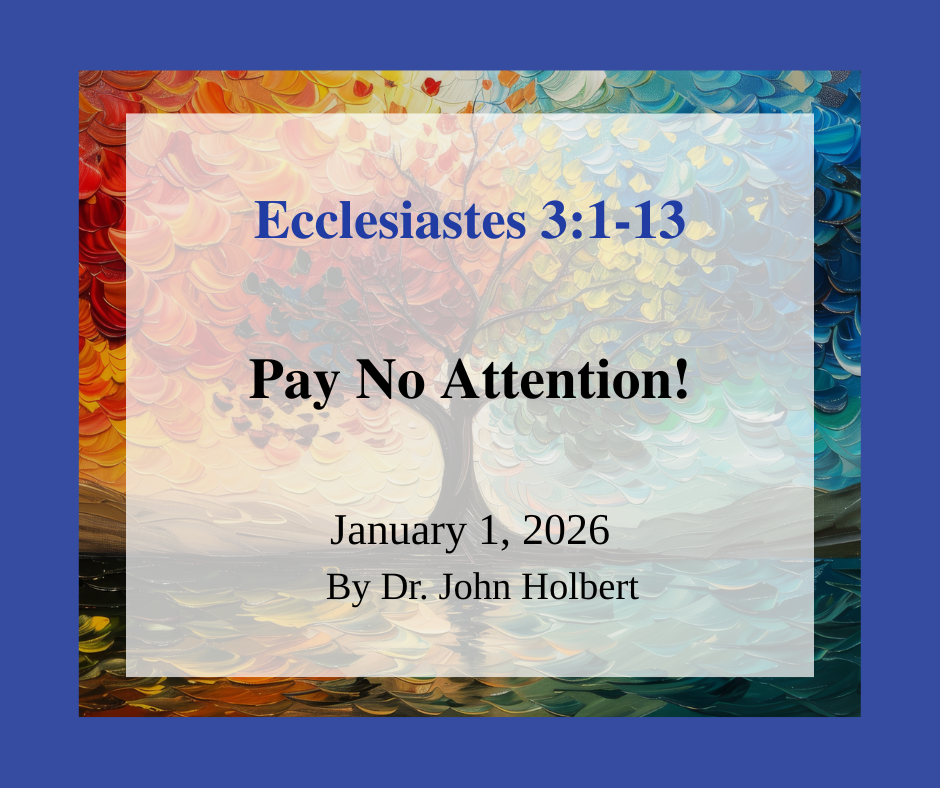Pay No Attention! Reflections on Ecclesiastes 3:1-13, New Year's Day, Year A
by John C. Holbert on Friday, October 24, 2025

Invariably, the lectionary collectors choose this passage as the one that for them apparently epitomizes how we ought to think about things as we begin a new year. And, equally invariably, I attempt to indicate how this particular text ought to be the very last one that anyone should pay any attention to at all! Despite the sappy musical version that appeared in 1965 by “The Byrds,” though written in 1959 by Pete Seeger, and became an international hit, the words that underwrite the catchy tune are words that lead directly to despair if taken in the way that old Koheleth intended. In other words, pay no attention to them if you hope to have a year filled with hope and optimism.
I know how “realistic” those words sound. After all, Koheleth (the Hebrew title of the “author” of the book) is surely correct to suggest that “for every thing there is a season”—being born, dying; planting and harvesting; killing (really?) and healing; destroying and building; weeping and laughing; mourning and dancing; throwing stones and gathering them up; embracing and avoiding such embraces; seeking and losing; keeping and throwing away; ripping apart and sewing; keeping quiet and speaking up; loving and hating (?); war and peace. Indeed, those pairs are a summary of what human life has presented down the ages. I would question whether or not there really is a season for killing and hating, but there is no doubt that humanity has regularly resorted to both.
When Pete Seeger wrote the piece he added his own words at the end to suggest “I swear it’s not too late.” He meant by that addition that world peace was still possible. In 1965, that hope for peace was made all the more relevant as the war in Vietnam began in earnest, and the song became a plea to end that war, a fact that led directly to its huge popularity.
Koheleth knew nothing of that. His poem was instead a statement about the sameness and weariness of all human life. After all, he begins his book with the infamous lines: “Mist of mist, all is mist. What do people gain for all their toil,” with the implied answer—absolutely nothing! The far more familiar translation, “Vanity of vanities” no longer conveys what the old philosopher had in mind. His point, using the Hebrew hebel, is that all is in the end transient and insubstantial, and has always been and will always be exactly like that. Hence, the paired-poem, the this and that of the words, are another sign that life is weariness, unchangeable, fixed in a pattern that will be the same far into the future. In many ways, Koheleth offers a view of life and existence that is completely antithetical to the bulk of the Bible’s central teaching. God is a God of newness and hope, calling the people to change and grow into love and compassion for all creation. Hardly, screams Koheleth! God is far off, uninterested, uncaring, unconcerned.
Or, perhaps God, he says, is even worse than that, as Ecc.3:9-11 may suggest. Here is what those lines say: “What gain do workers get from their labor? I have seen what business God has given to everyone to be busy with. God has made everything for its own time, but has put into every mind ‘olamin such a way that they can never find out what God has done from beginning to end.” I find this nothing less than astonishing! Here is what those lines seem to imply: God has created things all right, but has teased us with ‘olam, a very slippery Hebrew word, making it completely impossible for anyone to understand what God was about in that creation, yet offering only the vaguest of ideas about what God was in fact up to when God created in the first place! We know just enough, says Koheleth, to know how little we know about much of anything! NRSV reads ‘olam as “a sense of past and future,” which does capture something of the term, but fails to include the confusion it causes in humans who attempt to understand something of the meaning of their lives, but inevitably fail, yet must keep on trying because God has planted that longing, doomed to failure, in all of us. I find this notion very dark indeed!
And I say, pay no attention to these musings which I find to be philosophical blather, uttered by a mean-spirited mountebank, who speaks out of a forlorn and empty life experience. Instead, focus attention as you start another year on the riches of the prophets’ cry for the work of justice, and the call of Jesus to live your life for others. Koheleth may have inspired a best-selling song, but his words are, as he says again and again, finally empty, meaningless twaddle.
